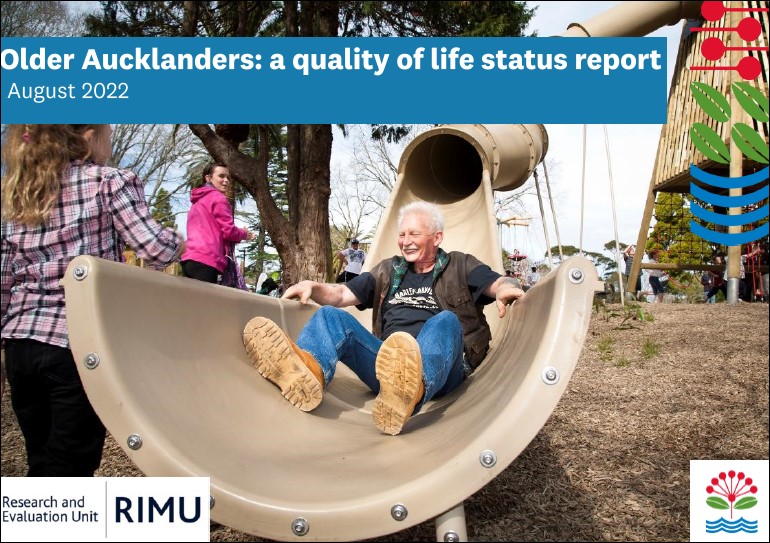Older Aucklanders: a quality of life status report
Author:
Ashleigh Prakash, Kathryn OvendenSource:
Auckland Council Research and Evaluation Unit, RIMUPublication date:
2022Topics:
PeopleNote: the report is published in two parts. Part 1 download on the right, above. Part 2 here.
Extract from the Executive summary
Tāmaki Makaurau/Auckland is undergoing significant changes in its population structure. In Auckland, it is expected that there will be rapid growth in the coming decades among those aged 65 and over, from 12 per cent in 2018 to a projected 19 per cent by 2048. This trend is unprecedented in New Zealand but is consistent with overseas phenomena. Auckland Council has a clear strategic directive to recognise what older people can offer to the community and to respond to their needs, particularly as they constitute a growing proportion of Auckland's population. This directive is outlined in the Auckland Plan 2050 and the Tāmaki Makaurau Tauawhi Kaumātua - Age-friendly Auckland Action Plan. One of the aims of the Age-friendly Action Plan is to improve the quality of life for older Aucklanders, which will help guide actions to support this group.
Understanding the quality of life of older Aucklanders is a key strategic focus for council. Council's Research and Evaluation Unit (RIMU) conducted a baseline study in 2016-2017 to develop an evidence base about the quality of life of Aucklanders aged 65 years and over. Auckland's demographic, social, and economic landscape has undergone substantial change over the six years since the baseline study. Factors such as the COVID-19 pandemic, housing affordability, the increasing cost of living, and climate change all have a growing and ongoing impact on quality of life. The baseline dataset required updating to monitor changes over time and understand the current state of older Aucklanders' quality of life.
This report explores the current state of older Aucklanders' quality of life. We analysed data from secondary sources as well as primary data from a survey of Aucklanders aged 65 years and over. The 2021 survey collected responses from over 1400 older Aucklanders. We also compared survey responses, where possible, to results from the baseline 2016 survey (where 846 people responded).
Findings revealed that although older Aucklanders as a broader group experience a high level of quality of life, there is also a considerable amount of diversity in their lived experiences. For instance, older people living in the central and northern areas of Auckland were generally more positive about the different domains contributing to quality of life. Meanwhile, residents in the eastern, southern, and western parts of Auckland reported more negative experiences, particularly concerning housing affordability, economic living standards, and perceptions of safety at home and in their local neighbourhoods.
Quality of Life of Older Māori in Auckland
An additional qualitative research study was undertaken to explore the quality of life for older Māori, to support the Kaumātua domain of the Age-friendly Auckland Action Plan and provide deeper insight into the wellbeing of older mana whenua (iwi and hapū with historic and territorial rights in Tāmaki Makaurau), and mataawaka (urban Māori). This research on the quality of life of older Māori Aucklanders was led by Māori researchers, and guided by a Rōpū Kaumātua. The Quality of Life of Older Māori in Auckland report can be found on the Knowledge Auckland website. ...
Auckland Council technical report, TR2022/22
August 2022
See also
